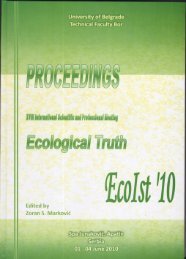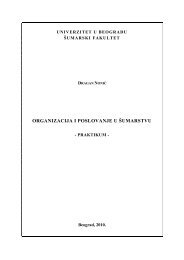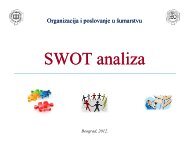- Page 2 and 3:
International Conference: Degraded
- Page 4 and 5:
International ConferenceDegraded ar
- Page 6 and 7:
Međunarodna konferencijaDegradiran
- Page 8 and 9:
vii
- Page 10 and 11:
URBAN AIR QUALITY MONITORING NETWOR
- Page 12 and 13:
THE INFLUENCE OF AGROECOLOGICAL CON
- Page 14 and 15:
ČVRST I OPASAN OTPAD KAO FAKTORDEG
- Page 16 and 17:
1. OTPAD - ASPEKTI DEGRADIRANJA ŽI
- Page 19 and 20:
Energetske, ekonomske i ekološke p
- Page 21 and 22:
proizvodnje, jedan deo, dospevši u
- Page 23 and 24:
U zavisnosti od kvaliteta i kvantit
- Page 25 and 26:
DEGRADED FOREST RESOURCES OF THEREP
- Page 27 and 28:
između centara klastera 4 kilometr
- Page 29 and 30:
2. REZULTATI ISTRAŽIVANJA2.1.Prost
- Page 31 and 32:
Slika 2: Prostorni raspored različ
- Page 33 and 34:
Slika 3: Prostorni raspored šuma p
- Page 35 and 36:
Slika 4: Zone degradiranosti šuma
- Page 37 and 38:
REFERENCE[1] M. Krstić, "Gajenje
- Page 39 and 40:
ENVIRONMENTAL DEGRADATION ANDHUMAN
- Page 41 and 42:
takođe biti i izraz (način) pona
- Page 43 and 44:
na zdravlje, društvena zajednica p
- Page 45 and 46:
Tabela 1. Pregled ulaznih podataka
- Page 47 and 48:
Tabela 2. Vazduh_Eks* Izloženost v
- Page 49 and 50:
Za podatke o dnevnoj zagađenosti,
- Page 51 and 52:
ZAKLJUČAKIndikatori su snažan ins
- Page 53 and 54:
AIR POLLUTION IN REPUBLIC OF SERBIA
- Page 55 and 56:
Čađ čine veoma fine, male česti
- Page 57 and 58:
prekoračenjem, do 3 dana godišnje
- Page 59 and 60:
u Boru na dva merna mesta, u Smeder
- Page 61 and 62:
~ 60 ~
- Page 63 and 64:
UVODPre 35,000 godina na zidovima u
- Page 65 and 66:
2. DEGRADIRANI PROSTORI U SMISLU GI
- Page 67 and 68:
3. IZRADA EKOLOŠKE KARTE SRBIJEIzr
- Page 69 and 70:
ZAKLJUČAKFormiranje Ekološkog Inf
- Page 71 and 72:
AGRICULTURAL LAND CHANGE IN TIMEPER
- Page 73 and 74:
Gradilišta (klasa 133) - površine
- Page 75 and 76:
U odnosu na ukupnu površinu terito
- Page 77 and 78:
Slika 1, Prenamena poljoprivrednog
- Page 79 and 80:
ZAKLJUČAK- Na osnovu dobijenih rez
- Page 81 and 82:
vezanih za zaštitu životne sredin
- Page 83 and 84:
Kruženje vode u prirodi nazivamo h
- Page 85 and 86:
4. ZAGAĐIVANJE VODA U SRBIJIPovrš
- Page 87 and 88:
Nepoštovanje karence (minimalan br
- Page 89 and 90:
nizvodno od Niša, deo Đetinje od
- Page 91 and 92:
~ 90 ~
- Page 93 and 94:
UVODPostoje različite vrste faktor
- Page 95 and 96:
Ova vrsta eksperimenta izvedena je
- Page 97 and 98:
Slika 1. Koncentracije nitrata u od
- Page 99 and 100:
Determinacija i konstatovanje prisu
- Page 101 and 102:
sitnije pore i voda se sporije kre
- Page 103 and 104:
TOXIC ELEMENTS IN AGRICULTURAL LAND
- Page 105 and 106:
Ekstrakcija potencijalno toksičnih
- Page 107 and 108:
Tabela2. Toksični elementi u uzorc
- Page 109 and 110:
REFERENCE[1] ISO standardi; 11466,
- Page 111 and 112:
URBAN AIR QUALITY MONITORINGNETWORK
- Page 113 and 114:
2. REZULTATIRezultati merenja preze
- Page 115 and 116:
Београд (1999-2008.г.)45404
- Page 117 and 118:
50454043,540,47mikrogram/m 33531302
- Page 119 and 120:
špicevima. Drugi tip je raskrsnica
- Page 121 and 122:
~ 120 ~
- Page 123 and 124:
MINING MINERAL RESOURCES - POLLUTIO
- Page 125 and 126:
dinamičnu procesima, potpuno druga
- Page 127 and 128:
Ekološki problemi koji se javljaju
- Page 129 and 130:
~ 128 ~
- Page 131 and 132:
CAUSES AND CONSEQUENCES OF SOILDEGR
- Page 133 and 134:
Svi vidovi degradacije (oštećenja
- Page 135 and 136:
• primjenu sistema kontrole plodn
- Page 137 and 138:
IDENTIFICATION OF DEGRADED AREAS IN
- Page 139 and 140:
Eksploatacija mineralnih resursa (
- Page 141 and 142:
okviru programa Geografskog Informa
- Page 143 and 144:
Slika 3. Divlje deponije na teritor
- Page 145 and 146:
sprovođenja postupka sanacije reku
- Page 147 and 148:
[3] S. Nešković, „Zemljište i
- Page 149 and 150:
Abstract: Industrial facilities in
- Page 151 and 152:
Tabela 1. Količine otpadnih voda o
- Page 153 and 154:
Taloženje po Imhoff-u(ml/ l) nakon
- Page 155 and 156:
Taloženje po Imhoff-u(ml/ l) nakon
- Page 157 and 158:
Kada je reč o prečišćavanju ve
- Page 159 and 160:
zadržavanje vode, samoprečišćav
- Page 161 and 162:
~ 160 ~
- Page 163 and 164:
ANTHROPOGENIC INFLUENCE ON GROUNDWA
- Page 165 and 166:
~ 164 ~
- Page 167 and 168:
3025koncentracije nitrata (mg/dm 3
- Page 169 and 170:
141210NO 3 (mg/dm3 )864201991 1992
- Page 171 and 172:
nitratnih jona u padavinama. Izvrš
- Page 173 and 174:
SPATIAL DEGRADATION CAUSED BYINDUST
- Page 175 and 176:
industrijskih otpadnih voda bez tre
- Page 177 and 178:
Slika 1. Industrijska postrojenja k
- Page 179 and 180:
otpada. Iz zvaničnih podataka Agen
- Page 181 and 182:
proizvodnji električne energije i
- Page 183 and 184:
unapređenju postojećeg stanja ogl
- Page 185 and 186:
MONITORING WATER CHEMISTRY OFSOURCE
- Page 187 and 188:
Slika 1: Geografski položaj opšti
- Page 189 and 190:
hidrogeološkom kompleksu, između
- Page 191 and 192:
Slika 4: Karta izolinija maksimalni
- Page 193 and 194:
ZAKLJUČAKKako bi se utvrdila defin
- Page 195 and 196:
MEANDERS TAMISDimitrijević Vojkan,
- Page 197 and 198:
apsorbovati i skladištiti teške m
- Page 199 and 200:
Slika 2, Farkaždinski meanderTeren
- Page 201 and 202:
3. REZULTATI I DISKUSIJATerensko is
- Page 203 and 204:
- obnavljanje, odnosno remediranje
- Page 205 and 206:
Module A2: Integraded menagement of
- Page 207 and 208:
RELEASE OF CARBON STORED IN WOODS O
- Page 209 and 210:
1. ŠUME U SRBIJI I RAZLIČITI OBLI
- Page 211 and 212:
2. UGELJENIK VEZAN U ŠUMAMA SRBIJE
- Page 213 and 214:
drugi). Između svih ovih elemenata
- Page 215 and 216:
Pomoćnepromenljive4 Musled procesa
- Page 217 and 218:
Martino, O. Masera, B. Metz, L. A.
- Page 219 and 220:
have?'' and (ii)''Where do we have?
- Page 221 and 222:
• Zelene površine podižu kvalit
- Page 223 and 224:
. Bit digitalizovanog katastra urba
- Page 225 and 226:
~ 224 ~
- Page 227 and 228:
MANAGEMENT STRATEGY OF DEGRADATIONS
- Page 229 and 230:
1. REZULTATNa realizovanje odabrane
- Page 231 and 232:
Osnovni principi primene Kost-benef
- Page 233 and 234:
REFERENCE[1] J. D.Botler, R.Grusin,
- Page 235 and 236:
WASTE MANAGEMENT AND MODELRECYCLING
- Page 237 and 238:
1. IDENTIFIKACIJA DIVLJIH DEPONIJA
- Page 239 and 240:
Naziv naselja: Topolnica• Lokacij
- Page 241 and 242:
Naziv naselja: Boljetin• Lokacija
- Page 243 and 244:
na otvorenom ( restoranske terase,
- Page 245 and 246:
Module B1: Remediation methodsModul
- Page 247 and 248:
slučaju da je zemljište izgubilo
- Page 249 and 250:
ezultate objavljuje (REF site). Nos
- Page 251 and 252:
Br.1.2.3.4.5.6.7.Tabela 1. Spisak p
- Page 253 and 254:
4. “UPOREDNA ISTRAŽIVANJA ADAPTA
- Page 255 and 256:
mase useva sa druge. Direktni unos
- Page 257 and 258:
UMESTO ZAKLJUČKARealizacije oba pr
- Page 259 and 260:
~ 258 ~
- Page 261 and 262:
human activities, which endanger an
- Page 263 and 264:
activity of added soil bacteria of
- Page 265 and 266:
BactoFil A, BactoFil B, Teralyt Plu
- Page 267 and 268:
evaluated as low. Only in case of p
- Page 269 and 270:
Table 3, Results of microbiological
- Page 271 and 272:
oth preparations on growth paramete
- Page 273 and 274:
Agency for the Support of Research
- Page 275 and 276:
invested in the promotion and prote
- Page 277 and 278:
interesting and endangered species
- Page 279 and 280:
3. ECOREMEDIATION TEHNOLOGIESMan ha
- Page 281 and 282:
pond and learn about ecoremediation
- Page 283 and 284:
[6] A. Vovk Korže, "Ekoremediacije
- Page 285 and 286:
PLANTING MATERIAL PRODUCTION FORBIO
- Page 287 and 288:
podrazumeva proizvodnju sadnica u p
- Page 289 and 290:
VrstasupstrataCrvenipesakŽutipesak
- Page 291 and 292:
VrstasupstrataCrvenipeskoviŽutipes
- Page 293 and 294:
ZAKLJUČAKNepovoljni uslovi kojima
- Page 295 and 296:
~ 294 ~
- Page 297 and 298:
THE INFLUENCE OF AGROECOLOGICALCOND
- Page 299 and 300:
je izvedena tokom aprila, a proređ
- Page 301 and 302:
Tabela 2.Hemijski sastav različiti
- Page 303 and 304:
Garcia, M., D. Raes, D., Jacobsen,
- Page 305 and 306:
PROBLEMS OF UTILIZING RIVER AS ANAT
- Page 307 and 308:
enaturalilzacije reka. Ovaj proces
- Page 309 and 310:
• državnog vlasništva nad priro
- Page 311 and 312:
„zelenu energiju“ [9], koja zah
- Page 313 and 314:
miliona švajcarskih franaka) i sep
- Page 315 and 316:
[8] M. Fette, C. Weber, A. Peter, B
- Page 317 and 318:
1. ENVIRONMENTAL PROBLEMS OF INDUST
- Page 319 and 320:
their opinion an industrial ecosyst
- Page 321 and 322:
4. ECOREMEDIATIONS IN ZONE TEZNOZon
- Page 323 and 324:
Figure 2: Possible ecoremediations
- Page 325 and 326:
[12] Vovk Korže,A., Vrhovšek, D.
- Page 327 and 328:
ECOREMEDIATION PLAN METHODOLOGYDEVE
- Page 329 and 330:
Izrada ERM plana 7 ima višenamensk
- Page 331 and 332:
• Nedovoljna (nepouzdana) ispitan
- Page 333 and 334:
Laboratorijskim i terenskim istraž
- Page 335 and 336:
sačekati da se infiltracioni rasko
- Page 337 and 338:
Happens to the Waste in Landfills?,
- Page 339 and 340:
greenhouse effect, climate changes
- Page 341 and 342:
intended for planting fast-growing
- Page 343 and 344:
‣ Sites that are part of the fram
- Page 345 and 346:
worked the land before its afforest
- Page 347 and 348:
the EU. Program is implemented by f
- Page 349 and 350:
~ 348 ~
- Page 351 and 352:
ECOREMEDIATION IN AGRICULTURE -FARM
- Page 353 and 354:
drugo. Prema nekim podacima u Srbij
- Page 355 and 356:
Kao rezultat tih rasprava proistekl
- Page 357 and 358:
Vlajković i ostali u svom radu “
- Page 359 and 360:
− mikrobioloških svojstava ima k
- Page 361 and 362:
notice there were afforested about
- Page 363 and 364:
about 20-40 years after their estab
- Page 365 and 366:
4-4.5 m. Its mean increment is 0.1-
- Page 367 and 368:
Growth of the stands of forest tree
- Page 369 and 370:
MICROBIOLOGICAL ACTIVITY OF THEDEPO
- Page 371 and 372:
[6], ili je više elemenata zajedno
- Page 373 and 374:
2.2. Hemijske osobine supstrataU is
- Page 375 and 376:
2.4. Biološke osobine odloženog s
- Page 377 and 378:
3.3. Faktori koji mogu uticati na r
- Page 379 and 380:
[13] Zak, B. ׃ " Role of mycorrhiz
- Page 381 and 382:
PROTECTION AND IMPROVEMENT OF SILVE
- Page 383 and 384:
1. POČETNA ISTRAŽIVANJA I REZULTA
- Page 385 and 386:
TVRDOĆA VODEMEKE20%UMERENOTVRDE7%T
- Page 387 and 388:
Tabela 1. Debljina i procentualni s
- Page 389 and 390:
Brojnost organizama preračunata je
- Page 391 and 392:
[4] Š. Đarmati, D. Veselinović,
- Page 393 and 394:
RECLAIMATION OF THE COPPER MINECHAT
- Page 395 and 396:
Slika 1. Odlagalište flotacijske j
- Page 397 and 398:
Slika 2.Ogled na odlagalištu flota
- Page 399 and 400:
pokazuju da se dodavanjem osnovnih
- Page 401 and 402:
REFERENCE[1] Dožić S. (1985): Ist
- Page 403 and 404:
substances into groundwaters. The s
- Page 405 and 406:
1. OBRAZOVANJE OSTATKA SAGOREVANJAU
- Page 407 and 408:
precipitacije ovih nutrienata u vid
- Page 409 and 410:
Leteći pepeo sadrži 60 - 95% čes
- Page 411 and 412:
sistemom brojnih biljaka) i bakteri
- Page 413 and 414:
vegetacije. Njihove osnovne uloge s
- Page 415 and 416:
REFERENCE[1] R.J.Haynes, „Reclama
- Page 417 and 418:
activities in urban areas eventuall
- Page 419 and 420:
2. PREDNOST ZELENIH KROVOVA2.1. Zdr
- Page 421 and 422:
2.1.4. Zeleni krovovi kao stanište
- Page 423 and 424:
studija govore i da se ostaci tešk
- Page 425 and 426:
instalacija. Uz oblikovanje hodnih
- Page 427 and 428:
~ 426 ~
- Page 429 and 430:
potencijala kojim raspolažu već p
- Page 431 and 432:
opština Stari grad, Savski venac i
- Page 433 and 434:
U istraživanom području ukupno je
- Page 435 and 436:
Slika2. Turska bašta u Kralja Mila
- Page 437 and 438: samo osnovnu negu, a pre svega meha
- Page 439 and 440: Vračar to najbolje potvrđuje), Be
- Page 441 and 442: ~ 440 ~
- Page 443 and 444: HOW TO APPROACH THE REMEDIATIONPROB
- Page 445 and 446: Značajan udeo troškova remedijaci
- Page 447 and 448: Na evropskom nivou rehabilitacija i
- Page 449 and 450: Katastri zagađenih lokaliteta pred
- Page 451 and 452: neophodan za donosioca odluka o pri
- Page 453 and 454: Module B2: Green technologyModul B2
- Page 455 and 456: SUSTAINABLE UTILIZATION OFSUBGEOTHE
- Page 457 and 458: Princip rada toplotne pumpe je pozn
- Page 459 and 460: 2. UTICAJ SGTP NA ŽIVOTNU SREDINUP
- Page 461 and 462: vode direktno u izdansku zonu na ve
- Page 463 and 464: dovesti do nepoželjne mineralizaci
- Page 465 and 466: REFERENCE[1].U.S. Environmental Pro
- Page 467 and 468: ~ 466 ~
- Page 469 and 470: REMEDIATION AND RECONSTRUCTION ATSA
- Page 471 and 472: odloženo oko 1 800 000 m 3 otpada,
- Page 473 and 474: 3. IZGRADNJA DEPONIJE U BUDUĆEM PE
- Page 475 and 476: ~ 474 ~
- Page 477 and 478: UVODIdeja tradicionalnog odnosa pre
- Page 479 and 480: Umetnički i naučni diskurs na pla
- Page 481 and 482: abSlika 3. a- Warren Angle : La Bre
- Page 483 and 484: Arboreal Dome ( Sl. 4b) izrađena o
- Page 485 and 486: ZAKLJUČAKProcesi degradiranja pros
- Page 487: ~ 486 ~
- Page 491 and 492: integralnog iskorišćavanja svih d
- Page 493 and 494: skupovi, od vrata do vrata, obilaza
- Page 495 and 496: Ne bi trebalo zaboraviti ni mogućn
- Page 497 and 498: vođena kroz projektni okvir koji s
- Page 499 and 500: ~ 498 ~
- Page 501 and 502: METHODS OF PURIFICATION OF WASTEWAT
- Page 503 and 504: karakteristična perioda: periodu b
- Page 505 and 506: strukturi industrije Grada dominira
- Page 507 and 508: postupka precipitacije uz doziranje
- Page 509 and 510: Procesna linija je projektovana tak
- Page 511 and 512: UVODZaštita kulturne baštine prip
- Page 513 and 514: Slika 1. Pogled na ulice Napulja [6
- Page 515 and 516: pitanje je da li je diskurs u stanj
- Page 517 and 518: Dakle, potrebno je razumeti lokalit
- Page 519 and 520: ~ 518 ~


![Conference proceedings - Zbornik Radova[1].pdf - Univerzitet u ...](https://img.yumpu.com/40717868/489/500x640/conference-proceedings-zbornik-radova1pdf-univerzitet-u-.jpg)













